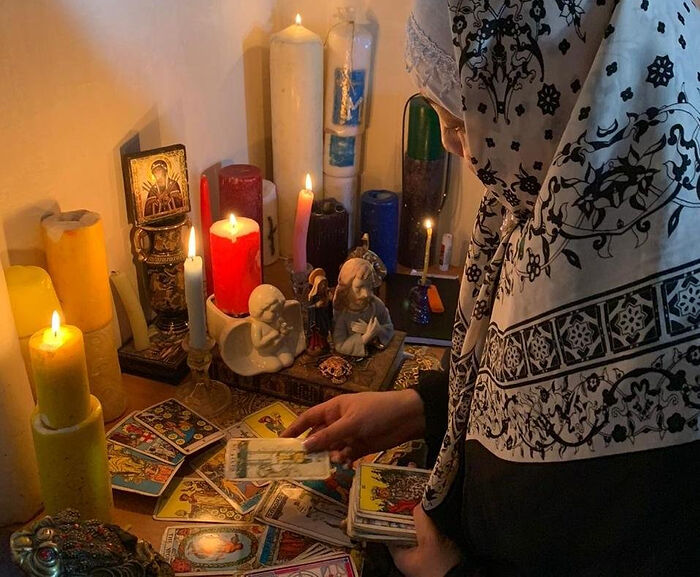Today we commemorate Martyrs Cyprian and Justina, whose Life beautifully illustrates how the power of God renders all occultism and magic ineffectual. But as another reminder, Fr. Valery Dukhanin discusses a certain practice amongst modern day “healers”—the use of a Christian veneer to lure people into thinking that the occultist’s power—demonic power—comes from God.
There is a special type of folk healer who uses church attributes, Christian symbols and prayers from the Orthodox prayer book in their practice. It is known that a practicing occultist is indifferent to God, has no interest in fellowship with Him, as his goal is to make a profit using cleanly delivered magic manipulations. The healers will surely make you believe that they have no self-interest or they heal exclusively by appealing to God. Indeed, you will neither see invocations from magic books, nor frightening rituals, but rather a prayer, the cross and the Gospel coming into view before the wondering gaze of a gullible visitor. This phenomenon was previously known mostly among countryside residents, but nowadays, because of the Internet and media advertising, it has become widespread and reached truly epidemic proportions. If people instinctively fear witches, these healers inspire confidence since they use the Christian symbols treated as something dear and special for our soul.
So, what is the nature of this phenomenon?
It would seem that this kind of healing is indisputable with regard to the Orthodox spiritual life. However, let’s remember a good old proverb: “Not all that glitters is gold.” If someone declares, “I use prayer to heal people,” we should already be concerned (sure, he may not even say it openly, but simply position himself as a healer who uses a church prayer, among other methods of healing).
Strictly speaking, no one can heal by simply reciting prayers. After all, we appeal to God in a heartfelt prayer, thus a prayer means that God will take action for both the one who prays and whom he prays for. That’s why in true prayer, we entrust ourselves and those we are praying for into God's hands. Therefore, the very expression (or idea) of healing by prayer is not appropriate. When we pray about something, we merely appeal to God. If it is beneficial to us He will grant it, but if it isn’t, He won’t answer our prayer, even if we bang our heads against a brick wall. Prayer isn’t a tool to manipulate others, but rather a humble appeal that prioritizes the will of God about someone in your petition—and not our prideful aspiration. This is why every single church Litany (i.e., petition) concludes with, “Let us commit ourselves and each other and all our life unto Christ our God.” Therefore, it’s impossible to transform another person’s physical condition by simply reciting prayers. Only God, by His grace, can act and heal, while we should humbly beseech Him to grant us healing, if it is pleasing to Him. God helps only those who He finds can benefit from it, so reading a prayer rule cannot guarantee that you will receive what you are asking for.
At the same time, it is impossible to deny the obvious effect a healer's work has on someone seeking help from them (or the sorcerers). I once was given the following example. One man spent all his life in the countryside and got infected with hairworm (a common name for a parasite that’s very hard to get rid of). When he lost all hope of ever recovering from it, he turned to a famous healer from his village. She set up a simple rule: at dawn she’d take him to a certain place to read the prayer, “Rejoice, O Virgin Theotokos”, a number of times and his disease would be cured. It is hard to judge, not knowing who those people were, whether the prayer request culminated in grace-filled response from God or if it was a psychic practice disguised as a prayer rule. But the difference, despite the similarities, is profound.
It is important to understand the fine balance here. It is one thing when Orthodox Christians decide to pray for their seriously ill neighbor together with others, or separately. Our Church has special prayers beseeching God to grant health. Pray for one another that you may be healed (James 5:16), says the Scripture. We also serve molebens at church for the health of the soul and body, and there is the Sacrament of Holy Unction, which has helped many people receive healing from the most severe illnesses. Personal prayer is very important as well, and we may choose to add a special prayer rule asking the Lord to grant healing. It is quite simple—we pray to God for the recovery of a sick person. When it doesn’t go against the will of God and it is good for the sick person, the Lord grants healing or eases suffering. So Abraham prayed to God; and God healed Abimelech, and his wife, and his female servants. Then they bore children (Genesis 20:17), is an example of such prayer from the Holy Scripture. Even if a holy person is mentioned in this case, we shouldn’t go overboard looking for someone who is “intimately close” to God and have him pray for us. We can easily fall prey to a scammer, a mentally deranged person, or someone in spiritual delusion. The Lord bestows only on a select few the gift of serving others, and then only after they have practiced asceticism for a long time. That’s why it is best to address a priest, since his ministry is primarily about prayer, or someone dear to you who in earnest and sincerity will pray to God about healing. And the prayer of faith will save the sick (James 5:15).
It is another thing is if you meet someone who announces pretentiously, “I heal with prayer” and uses the church prayers as some kind of a mysterious method of reversing the person's physical condition from sickness to health. Let’s say, someone has a headache and he finds this kind of a healer who says, “That's all right, I will read the prayer rule, place hands on your head, and it will be gone.” This only means that the healer is using the same mysterious or, in other words, occult ability to influence people, but instead of psychic passes or witchcraft spells, he appears to use Orthodox prayers. A certain prayer rule is perceived as a formula that only helps as long as the patient fully entrusts himself to this particular healer. It is appropriate to recall in this case the words spoken by the psalmist David: And let his prayer become sin (Psalm 108:7), or what God said through the prophet Isaiah: When you stretch out your hands, I will hide My eyes from you; Even though you make many prayers, I will not hear (Isaiah 1:15). The healing effect doesn’t happen because of witchcraft rituals and incantations, but due to a special psychic energy of the healer, who conveniently uses the textual order of the prayer as a magic spell as it suits his personal tastes.
It is revealing that the Church applies a universal rule to such cases and the healers of this kind never obtain a blessing to conduct their manipulations (despite them often claiming the opposite). They aren’t leading a particularly active church life, let alone participating in the sacraments of confession and Communion on a regular basis. What these people definitely never have is serious spiritual guidance or a father confessor to talk to about their lives. Addressing the apostles and in them all clergymen, the Lord Jesus Christ said, He who hears you hear Me, and he who rejects you rejects Me, and he who rejects Me rejects Him who sent Me (Luke 10:16). The people we are talking about don’t seem like they are against the Church and even use the objects sold in the church stores, but at the same time, they are somewhat detached from the Church.
This is how a contemporary clergyman describes his experience with such a healer: “At the onset of perestroika, a middle-aged woman from the Komi Republic came to me for confession. About a year before that, she went to church for the first time in her life and bought several icons and a prayer book. She hung the icons in the corner of her home and was just about to pray when her neighbors, an elderly couple, came over. Seeing the icons in the corner, they wondered what they were for. The woman explained that no one from their village had ever visited a church, because the nearest one was located at least three hundred kilometers away. She satisfied their curiosity as best as she could and offered to pray together using a prayer book she just purchased. The neighbors stood next to her, and she began reading prayers for the first time in her life. The next day, they came again, saying that yesterday’s prayers gave them a relief from pain—the husband was relieved of an earache and his wife’s back pain was gone.
Of course, God's mercy knows no limits. In a situation when the residents of a godforsaken village never met anyone who could tell them about God, He could grant healing through a woman without any religious education and bring people closer to Him. The problem was that after that incident, the villagers didn’t turn to God, but to the woman who became known as a "healer." Her neighbors recommended her to all of their friends who needed help. But it never occurred to her that the evil one could be plotting against her. Besides, she knew neither God’s commandments nor basic Christian teaching, nor even the purpose of Christian life. For forty-seven years she was living the life of an ordinary Soviet woman, with all the attendant peculiarities of thinking, culture, worldview and manner of life. It is quite understandable that over the years this woman had committed the sins, even mortal ones, but she never repented of them or knew anything about the need to have confession. Neither did she know anyone who could tell her that it takes many years of hard work to get rid of sinful habits and addictions. This all played into the hands of demons to make her think that she was handpicked by the Lord to help Him heal people. It never occurred to her that she, with all of her sins, was unworthy of it... However, the Lord did not allow her to go on with it and gave her the chance to exercise her free will. She happened to come to our church “by chance” exactly on the day when I was giving a sermon before confession about this kind of demonic trickery. Once the service was over, she came up to share her story with me in an attempt to find out whether her unexpectedly manifested “abilities” belonged to the same series of demonic manifestations that I was just talking about. This woman believed that the integrity of her case was guaranteed by the fact that she read nothing but prayers from the Orthodox prayer book and that she never took any other actions. Naturally, she believed that she received the power to heal from God and, what’s important, unexpectedly and as a gift. Talking to her wasn’t easy. She really hated to part with her role of a “healer” and to become once again a simple and unremarkable woman.” 1
St. John Cassian the Roman wrote the following in this regard: “But he who aims at commanding unclean spirits, or bestowing gifts of healing, or manifesting some wondrous miracle to the people, even though he invokes the name of Christ while making his show, yet he is far from Christ, because in his pride of heart he does not follow his humble Teacher...”2 Therefore, it is a matter of a truly subtle substitution. Had everything in our world been immediately presented in a true light, the people would have never been tempted or seduced, but saw the heart of the matter and arrived at appropriate conclusions right away. Unfortunately, people were making mistakes throughout the history of sinful mankind and what seemed to them at first as one thing, appeared, upon closer acquaintance, in a completely different light.
Yours truly once met a man who claimed he had visions of Christ, Who spoke to him. This man was a tractor driver. He was buying a church candle stand in a Sofrino church supply store, according to the will, as he said, of Jesus Christ. “Truly so,” the son of toil would reiterate, “He was the One who told me to buy it for the church, quite literally.” When we asked “witness” whether he was convinced of validity of his revelations, he responded with great conviction and complained that the priests don’t believe him. He’d warmly recall how he heard the “higher” truths: “Say, I am driving in a field (and I have poor eyesight), and he (that is, the invisible being who claimed to be Christ.—auth.) says laughingly: “What, you blind fool, can't you see?” In such situations everything is quite clear. Where can you find in the Gospel that the Lord laughs or uses silly, worldly remarks? But still, this odd invisible being urged his channeler to attend a church and even to donate there. So, the apparent virtuousness of whatever it is, be it demeanor, moral admonitions, doing good to others, can be totally alien to the grace of the Holy Spirit and the Lord Jesus Christ. For your faithfulness is like a morning cloud, And like the early dew it goes away (Hosea 6:4), to use the words of the Prophet Hosea. The demon can temporarily suggest something “nice,” because this ancient, cunning creature has got some far-reaching plans that extend far beyond the boundaries of earthly life. Naturally, if the deceived man had stumbled upon an idea of healing others and working miracles (although no such thing could be seen at the time), he’d have sought assistance from his invisible companion, who would have immediately converted his “prayer to Christ” to his own use.
Let’s look at this problem from another angle. A lot of people see no difference between primary and secondary things in their lives. Since they prioritize physical health, material well being, and family happiness, they fully concentrate on gaining all of that. When they do come to church, they fail to think about the salvation of their immortal soul, how to liberate it from the nets of sin or find fellowship with God, but instead their attention is focused solely on matters of earthly prosperity. That’s why they buy candles, drop pocket money in the alms box, or say occasional prayers. It is understandable that if you have such attitude to life, the healing received in a pseudo-church-like way will be considered as the criterion of truth.
The consciousness of the majority of people prevents them from thinking that a healer who restores someone’s physical health actually leads a godless life. If an illness goes away and the healer uses prayer and Christian symbols, he is undoubtedly pleasing to God. In his Conference “On Divine Gifts,” St. John Cassian the Roman spoke on this subject: “So, a man who indulges in obvious vices can occasionally work such wonders and thus be considered a holy man, a servant of God... and he who boldly believes that he possesses the gift of healing may be puffed up by pride of heart, and so falls more grievously. Hence it is that invoking the names of those, who, as they know, have no merits of holiness or any spiritual fruits, they pretend that by their merits, they are disturbed and made to flee from the bodies they have possessed.”3
However, the occultists like to refer to a famous fragment from the Gospel, where the apostles tell the Lord: Teacher, we saw someone who does not follow us casting out demons in Your name, and we forbade him because he does not follow us.” But Jesus said, "Do not forbid him, for no one who works a miracle in My name can soon afterward speak evil of Me. For he who is not against us is on our side (Mark 9:38-40). In making use of this passage, occultists find themselves trapped, because they openly testify that they don’t follow the Church, even if they pretend not to be against it.
Blessed Theophylact of Bulgaria, the famous interpreter of the Scriptures, offered the following commentary on the fragment quoted above: “At the beginning of the (Gospel) preaching, it happened that some people, moved by the passion of love of fame, wished to perform signs; but observing the power of the name of Jesus, they called on Him and thus performed signs, even if they were strangers unworthy of the grace of God. For it was pleasing to the Lord that the preaching be spread even by these unworthy ones.”4 Before Pentecost, the mere mention of the name of Christ worked wonders. That was at the beginning (and signs were wrought even through “those moved by the passion of love of fame” and “strangers unworthy of the grace of God”), until the Council of the Apostles received the Holy Spirit sent down by the Savior, thus becoming the holy Church and gaining the power to perform the signs and wonders of higher value.
Once the Church began marching triumphantly across the world and preaching the Gospel, we encountered a different situation. The book of Acts says, Then some of the itinerant Jewish exorcists took it upon themselves to call the name of the Lord Jesus over those who had evil spirits, saying, “We exorcise you by the Jesus whom Paul preaches.” Also there were seven sons of Sceva, a Jewish chief priest, who did so. And the evil spirit answered and said, “Jesus I know, and Paul I know; but who are you?” Then the man in whom the evil spirit was leaped on them, overpowered them, and prevailed against them, so that they fled out of that house naked and wounded (Acts 19:13-16). Consequently, evil spirits aren’t afraid of them who only call upon the name of the Lord, but rather those who are in communion with the Church and participate in Her sacraments.
It is important to understand that in genuine prayer it is not the words that work, but the power of Him to Whom we turn in prayer. A Christian believes in God and addresses Him using a church prayer, while God in response to the prayer bestows His beneficial power upon a Christian. But if a Christian has formed a distorted image of the spiritual world in his soul and has a distorted view of himself or God (for example, thinking too highly of himself as a chosen one and healer, or holding to heretical belief about the spiritual world as an impersonal energy principle), then his prayer, even using the same words, will neither reach God nor yield any results. On the contrary, there are fallen angels next to such person who surround him with their demonic energy and they can imitate good deeds, healings and fulfillment of prayers.
That’s why one of the strict warnings of Jesus Christ had to do with unlawful miracles performed under the guise of calling upon His name: Many will say to Me in that day, ‘Lord, Lord, have we not prophesied in Your name, cast out demons in Your name, and done many wonders in Your name?’ And then I will declare to them, ‘I never knew you; depart from Me, you who practice lawlessness!’ (Matthew 7:22–23). Yes, they prophesied, cast out demons, and performed many miracles by calling on the name of the Savior—but they ended up without Him. Because the very essence of their ministry was purely psychic, never grace-filled and spiritual. The words of Jesus Christ are sufficient for grasping the essence of this phenomenon.





